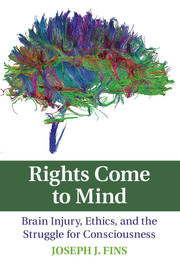Refine listing
Actions for selected content:
1174 results in Ebooks in neuroscience
Part V - Legal implications of neuroscience
-
- Book:
- Free Will and the Brain
- Published online:
- 05 October 2015
- Print publication:
- 18 September 2015, pp 229-286
-
- Chapter
- Export citation
3 - Evolution, dissolution and the neuroscience of the will
- from Part II - Conceptual issues
-
-
- Book:
- Free Will and the Brain
- Published online:
- 05 October 2015
- Print publication:
- 18 September 2015, pp 44-65
-
- Chapter
- Export citation
7 - How mental disorders can compromise the will
- from Part III - Mental capacities and disorders of the will
-
-
- Book:
- Free Will and the Brain
- Published online:
- 05 October 2015
- Print publication:
- 18 September 2015, pp 125-145
-
- Chapter
- Export citation
1 - Free will in light of neuroscience
- from Part I - Introduction
-
-
- Book:
- Free Will and the Brain
- Published online:
- 05 October 2015
- Print publication:
- 18 September 2015, pp 3-24
-
- Chapter
- Export citation
12 - Neurobiology collides with moral and criminal responsibility: the result is double vision
- from Part V - Legal implications of neuroscience
-
-
- Book:
- Free Will and the Brain
- Published online:
- 05 October 2015
- Print publication:
- 18 September 2015, pp 231-250
-
- Chapter
- Export citation
Contents
-
- Book:
- Free Will and the Brain
- Published online:
- 05 October 2015
- Print publication:
- 18 September 2015, pp v-vi
-
- Chapter
- Export citation

Rights Come to Mind
- Brain Injury, Ethics, and the Struggle for Consciousness
-
- Published online:
- 05 September 2015
- Print publication:
- 06 August 2015
9 - Leaving the Hospital
-
- Book:
- Rights Come to Mind
- Published online:
- 05 September 2015
- Print publication:
- 06 August 2015, pp 83-96
-
- Chapter
- Export citation
8 - From PVS to MCS
-
- Book:
- Rights Come to Mind
- Published online:
- 05 September 2015
- Print publication:
- 06 August 2015, pp 69-82
-
- Chapter
- Export citation
19 - Maggie Is in Town
-
- Book:
- Rights Come to Mind
- Published online:
- 05 September 2015
- Print publication:
- 06 August 2015, pp 248-271
-
- Chapter
- Export citation
Epigraph
-
- Book:
- Rights Come to Mind
- Published online:
- 05 September 2015
- Print publication:
- 06 August 2015, pp vi-vi
-
- Chapter
- Export citation
4 - The Origins of the Vegetative State
-
- Book:
- Rights Come to Mind
- Published online:
- 05 September 2015
- Print publication:
- 06 August 2015, pp 35-41
-
- Chapter
- Export citation
21 - The Rights of Mind
-
- Book:
- Rights Come to Mind
- Published online:
- 05 September 2015
- Print publication:
- 06 August 2015, pp 286-308
-
- Chapter
- Export citation
In Memoriam
-
- Book:
- Rights Come to Mind
- Published online:
- 05 September 2015
- Print publication:
- 06 August 2015, pp 355-356
-
- Chapter
- Export citation
5 - A Shift since Quinlan
-
- Book:
- Rights Come to Mind
- Published online:
- 05 September 2015
- Print publication:
- 06 August 2015, pp 42-48
-
- Chapter
- Export citation
11 - Neuroimaging and Neuroscience in the Public Mind
-
- Book:
- Rights Come to Mind
- Published online:
- 05 September 2015
- Print publication:
- 06 August 2015, pp 111-133
-
- Chapter
- Export citation
10 - Heather's Story
-
- Book:
- Rights Come to Mind
- Published online:
- 05 September 2015
- Print publication:
- 06 August 2015, pp 97-110
-
- Chapter
- Export citation
7 - Something Happened in Arkansas
-
- Book:
- Rights Come to Mind
- Published online:
- 05 September 2015
- Print publication:
- 06 August 2015, pp 59-68
-
- Chapter
- Export citation
Contents
-
- Book:
- Rights Come to Mind
- Published online:
- 05 September 2015
- Print publication:
- 06 August 2015, pp vii-viii
-
- Chapter
- Export citation
18 - It's Still Freedom
-
- Book:
- Rights Come to Mind
- Published online:
- 05 September 2015
- Print publication:
- 06 August 2015, pp 227-247
-
- Chapter
- Export citation
